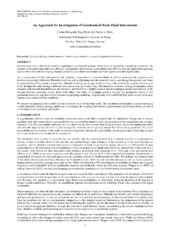An Approach for Investigation of Geochemical Rock-Fluid Interactions
Abstract
Geochemistry has a substantial impact in exploiting of geothermal systems. When water is injected in a geothermal reservoir, the injected water and in-situ brine have different temperatures and chemical compositions and will flow through highly heterogeneous regions where the rock has varying chemical properties and where temperature and flow regimes can alter significantly. As a consequence of flow and geochemical reactions, composition of reservoir fluids as well as reservoir rock properties will develop dynamically with time. Minerals dissolving and precipitating onto the reservoir matrix, can change the porosity and hence the permeability of the system substantially. Mineral solubility can change by the cooling of the rock by the injected water as well as by the injected water having a different salt content than the in-situ brine. The interaction between altering temperature, solute transport with mineral dissolution and precipitation, and fluid flow is highly coupled and challenging to model appropriately as the relevant physical processes jointly affect each other. The effect of changing porosity through the production period of the geothermal reservoir, may have severe impacts on operating conditions, as pores may close and block flow paths, or new pores may open to create enhanced flow conditions. We propose an approach that models all three processes on a relevant time scale. The considered mathematical and corresponding overall numerical solution strategy enables us to investigate the coupling between flow, geochemical and thermal effects, as well as to develop tailored numerical approaches.
